NIETZSCHE VERSUS PAUL
INSURRECTIONS: CRITICAL STUDIES IN RELIGION, POLITICS, AND CULTURE
INSURRECTIONS: CRITICAL STUDIES IN RELIGION, POLITICS, AND CULTURE
Slavoj iek, Clayton Crockett, Creston Davis, Jeffrey W. Robbins, Editors
The intersection of religion, politics, and culture is one of the most discussed areas in theory today. It also has the deepest and most wide-ranging impact on the world. Insurrections: Critical Studies in Religion, Politics, and Culture will bring the tools of philosophy and critical theory to the political implications of the religious turn. The series will address a range of religious traditions and political viewpoints in the United States, Europe, and other parts of the world. Without advocating any specific religious or theological stance, the series aims nonetheless to be faithful to the radical emancipatory potential of religion.
For a complete list of books in the series, see
NIETZSCHE
VERSUS
ABED AZZAM
PAUL
COLUMBIA UNIVERSITY PRESS  NEW YORK
NEW YORK COLUMBIA UNIVERSITY PRESS
Publishers Since 1893
New York Chichester, West Sussex
cup.columbia.edu
Copyright 2015 Columbia University Press
All rights reserved
E-ISBN 978-0-231-53897-8
Library of Congress Cataloging-in-Publication Data
Azzam, Abed.
Nietzsche versus Paul / Abed Azzam.
pages cm.(Insurrections: critical studies in religion, politics, and culture)
Includes bibliographical references and index.
ISBN 978-0-231-16930-1 (cloth: alk. paper) ISBN 978-0-231-16931-8 (pbk. : alk. paper) ISBN 978-0-231-53897-8 (e-book)
1. Nietzsche, Friedrich Wilhelm, 18441900. 2. ChristanityPhilosophy. 3. Christanity and atheism. 4. Dionysus (Greek deity) 5. Paul, the Apostle, Saint. I. Title.
B3318. C35A99 2015
193dc23
2014010861
A Columbia University Press E-book.
CUP would be pleased to hear about your reading experience with this e-book at .
COVER IMAGE: COMET HALE-BOPP BERND NIES
COVER DESIGN: CHANG JAE LEE
References to websites (URLs) were accurate at the time of writing.
Neither the author nor Columbia University Press is responsible for URLs that may have expired or changed since the manuscript was prepared.
FOR BALKIS
CONTENTS
During the several years I spent researching and writing this manuscript, I was surrounded by colleagues and friends who pushed this project toward its successful finalization each in his own way. I want to thank Adi Ophir for his stimulating responses and unceasing encouragement. I direct my thanks to Alfred Tauber for his extraordinary support and insightful notes on an earlier version of this manuscript. I am also tremendously thankful to Oded Schechter for his reading of the major parts of the manuscript and the countless conversations from which I learned enormously. Special thanks to Judith Butler for her generous and attentive reading of the manuscript. Also thanks to CUPs two anonymous readers for their thoughtful notes which left their stamp on the last version of this book.
I was lucky for being granted the help, support, advice, notes, and thoughts of all those who led the early versions of this manuscript to wear the form of this book. My distinctive thanks go to Amnon Raz-Krakotzkin, Christiane Aurich, Christoph Schmidt, Eliav Brand, Georges Khalil, Gideon Freudenthal, Kamal Aljafari, Samah Selim, Samera Esmeir, Uta Ruge, Yizhak Melamed, and Yossef Schwartz.
| BT | The Birth of Tragedy |
| UM | Untimely Meditations |
| DS | David Strauss, the Confessor and the Writer |
| HL | On the Uses and Disadvantages of History for Life |
| SE | Schopenhauer as Educator |
| WB | Richard Wagner in Bayreuth |
| HH | Human, All Too Human (I & II) |
| VM | Assorted Opinions and Maxims |
| WS | The Wanderer and His Shadow |
| D | Daybreak |
| GS | The Gay Science |
| Za | Thus Spoke Zarathustra |
| BGE | Beyond Good and Evil |
| GM | On the Genealogy of Morals |
| CW | The Case of Wagner |
| TI | Twilight of the Idols |
| AC | The Antichrist |
| EH | Ecce Homo |
| NW | Nietzsche Contra Wagner |
| DD | Dionysus-Dithyrambs |
| WP | The Will to Power |
| KGW | Kritische Gesamtausgabe Werke |
| KGB | Kritische Gesamtausgabe Briefwechsel |
In a letter from 1885, Nietzsche himself recognized the difficulties involved in the question about the identity of the essential-Nietzsche and suggested to hand this question over to time and wait until some genius in Socratic knowledge might appear and be able to unearth Mr. F. N. I do not intend in the present work to claim for myself the genius that Nietzsche himself did not own. Rather, I shall turn precisely to explaining how the knowledge of the essential-Nietzsche, or the knowledge of Nietzsches will to truth/illusion, is impossible, insofar as Nietzsches way to it cannot reveal it. Nietzsche Versus Paul is a study of the Christian embrace of Nietzsches sought-after truth that ends in its obliteration.
Deleuze responded thus to Heideggers interpretation of Nietzsche: The eternal return is as badly misunderstood as the will to power. [and] every time we interpret the eternal return as the return of the identical or the same, we replace Nietzsches thought with childish hypotheses. While Heidegger locates Nietzsche at the bosom of the negative term of Platonic metaphysics, Deleuze locates him at the other edge of philosophy. For Deleuze, the essence of Nietzsches philosophy is the affirmation of difference: What a will wants is to affirm its difference. In its essential relation with the other a will makes its difference an object of affirmation. Nietzsches philosophy, for Deleuze, forms an absolute anti-dialectics. And if this philosophy does come to occupy the negative standpoint of the Hegelian dialectics, it does so only through the great polemical range it has. The fact that otherness brings difference closer to negative dialectics does not imply that difference should necessarily become reactive. For, the will to power is not force but the differential element which simultaneously determines the relation of forces (quantity) and the respective qualities of related forces. It is in this element of difference that affirmation manifests itself and develops itself as creative.

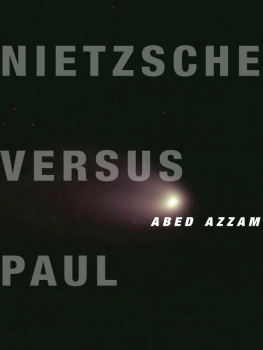


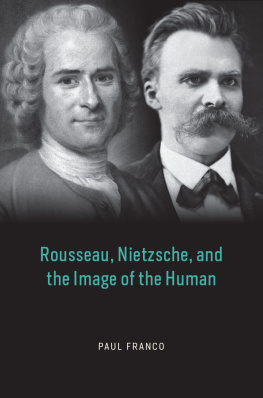
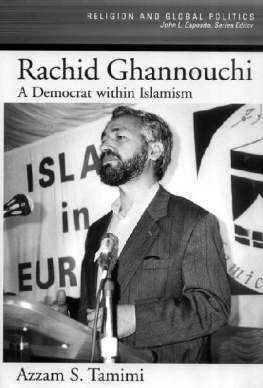
![Nietzsche - Twilight of the Idols [N.F. - Philosophy]](/uploads/posts/book/249935/thumbs/nietzsche-twilight-of-the-idols-n-f.jpg)
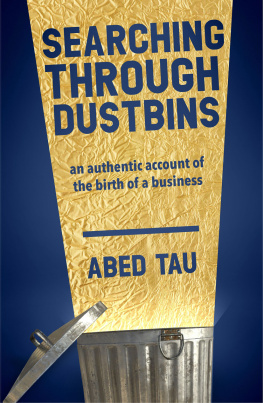
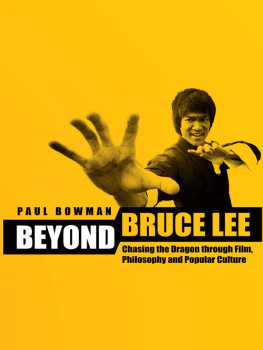

 NEW YORK
NEW YORK